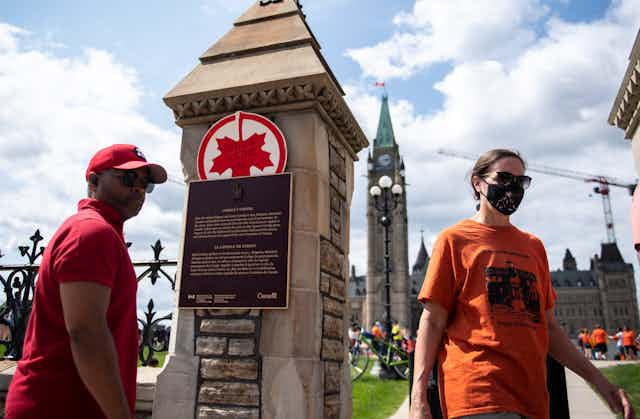Indigenous leaders have advised Canadians to brace themselves for findings of more unmarked graves of children on the sites of former Indian Residential Schools.
Speaking of the residential school legacies, Murray Sinclair, chair of the Truth and Reconciliation Commission, has said: “Education got us into this mess and education will get us out.”
To move forward in a positive way requires Canadians to acknowledge how schooling Indigenous people and settlers has advanced colonization. The problem is, too often, a refusal to know.
Read more: Why many Canadians don’t seem to care about the lasting effects of residential schools
Any honest historical examination of contemporary relations will challenge many Canadians’ cherished myths about our country, including the belief that Canada is a meritocracy with improving Indigenous-settler and race relations.
It also challenges the idea that all or most of those representing Canadians in government have the desire, power and commitment to solve inequities.
As a scholar concerned with how teachers’ own education shapes what happens in classrooms and how curriculum in Alberta schools can help students to be ethically engaged treaty partners, there are two concepts that may be helpful: considering learning in schools as a process of encounter and thinking about people’s relationships to stories about the past.
Learning is an encounter
The possibilities of what students learn at school are shaped by how teachers understand what they are doing.
Whether teachers learn to deliver curriculum as just a body of facts, attitudes and skills or whether they see themselves providing students opportunities to encounter new possibilities matters enormously.
For teachers, approaching curriculum as an encounter means looking at the ways in which students at any age have already learned much about making sense of life, their country and themselves in relation to others. What they take for granted as common sense is itself a historical legacy that requires explicit study.
To recognize is to “re-cognize”: to bring into consciousness so as to know again.
Understanding teaching an encounter asks educators to not only engage their students to “re-cognize” what they have been formally taught — but also what they have informally learned.
For example, students have been subject to imagined but powerful social ideas related to ideal or acceptable forms of sexuality, gender and racialization. We need look no further than examples of hateful slurs on bathroom stall walls or uttered in schoolyards to know that these powerful and dehumanizing ideas persist and require explicit attention.
Read more: Anti-Black racism is not a 'consensual schoolyard fight'

Tensions with preparing teachers
I conducted a study with five university social studies teacher instructors about how to prepare new teachers to engage the inclusion of Indigenous and francophone perspectives in Alberta’s (then new) current program of social studies. One finding from that study was the need to get better at equipping teachers and students to navigate discomfort and apprehension.
In teacher education, classrooms and beyond, what is needed is a cultural shift to valuing being “unsettled” by the unpleasant facts both of our historical and on-going relationships.
Educational institutions need to find ways to support students in understanding how we might forge our personal and collective identities ethically, responsive to all those with whom we are in treaty relations.

Easily digestable stories
The German scholar Jorn Rüsen argues that the ability to perceive moral obligations in the present is related to how we position ourselves in relationship to inherited stories from or about the past. He says our capacities to change our current moral course of action hinges on this and he speaks of “narrative competence.” I take this to mean the extent to which a person can learn useful lessons from a variety of stories about the past to think creatively about present and possible futures.
But the big stories about “our” origins as members of nation-states — what the theorist Jean-François Lyotard called “grand narratives” — work against narrative competence. These grand narratives are easily digestible stories around which an imaginary “we” can unite through the exclusion of others “not us.”
Two problems grand narratives present is that they oversimplify the complexity of the past and present, and contribute to narrow national identifications about who has and has not contributed to the building of the country. As a powerful cultural story template and meme, Canada’s grand narratives get retold in textbooks, heritage minutes and movies with an occasional addition of women, Indigenous and racialized people, immigrants or workers being added for flavour.
The power of stories to shape us
Researchers concerned with how people are understanding the call to truth, justice and reconciliation and what blocks it talk about “story-ing” — the process through which people understand their lives through the stories they are told and tell. It is my hope that non-Indigenous scholars continue to learn from Indigenous scholars and story tellers like Thomas King and Lee Maracle amongst many others in our local communities.
Read more: Leaked Alberta school curriculum in urgent need of guidance from Indigenous wisdom teachings
Canadians now need to acknowledge the power of stories to shape how people relate to each other, our non-human relatives, to the past, the nation and the world. And we need to ask whether we have the right stories to thrive well together in the face of present and future collective challenges.
The histories we tell each other must start with questions about justice and who we wish to collectively become. We need education that engages with our stereotypes and educated apprehensions so as to “re-story” a future better than that we have inherited.
If you are an Indian Residential School survivor, or have been affected by the residential school system and need help, you can contact the 24-hour Indian Residential Schools Crisis Line: 1-866-925-4419.

